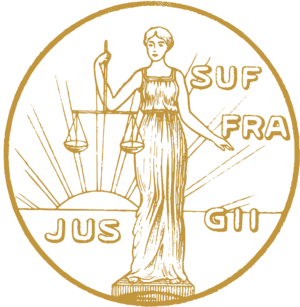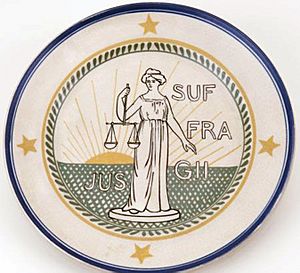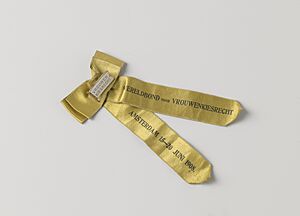International Alliance of Women facts for kids
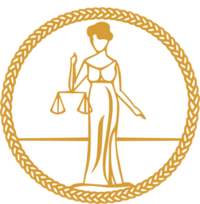 |
|
| Formation | Berlin, 3 June 1904 |
|---|---|
| Founder | Carrie Chapman Catt |
| Type | INGO |
| Purpose | Political advocacy |
| Headquarters | Geneva |
|
Membership
|
Over 50 organizations world-wide |
|
Official language
|
English and French |
|
President
|
Alison Brown |
|
Secretary-General
|
Miranda Tunica Ruzario |
| Affiliations | General Consultative Status with the United Nations Economic and Social Council, Participatory Status with the Council of Europe |
The International Alliance of Women (IAW) is a global group that works to protect women's rights and achieve gender equality. It is not part of any government. When it started, its main goal was to help women win the right to vote, which is called women's suffrage.
The IAW believes in a fair and equal world for everyone. It supports the idea that all people are born free and have the right to make their own choices. The group's main belief is that "women's rights are human rights." This means that the rights all people should have must also belong to women and girls.
The IAW is one of the oldest and most important organizations of its kind. It was founded in 1904 in Berlin, Germany. Famous activists like Carrie Chapman Catt, Millicent Fawcett, and Susan B. Anthony started the group to fight for women's right to vote around the world.
Today, the IAW focuses on many human rights issues. It has a special relationship with the United Nations (UN), where it gives advice on matters affecting women. The group has members from over 50 organizations worldwide and is based in Geneva, Switzerland.
Contents
History
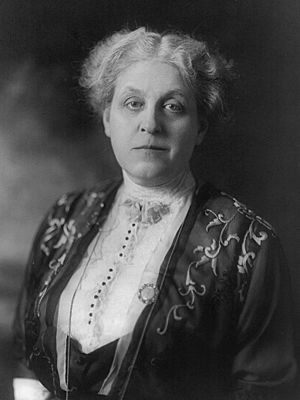
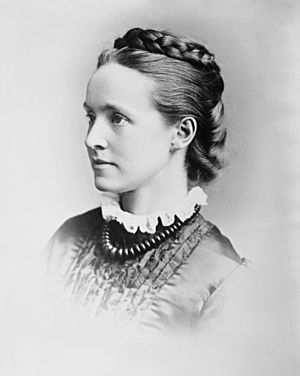
The Fight for the Vote
The idea for the IAW started in 1902 in Washington, D.C. A group of women felt that another organization, the International Council of Women, was not doing enough to support the fight for women's right to vote. So, they decided to create a new group focused on this important goal.
The new group was officially formed in 1904 in Berlin and was called the International Woman Suffrage Alliance (IWSA). Its founders included famous activists from many countries. The main office was in London.
The IWSA held meetings, called congresses, in different cities across Europe. These meetings helped bring together women from many nations who were all fighting for the same cause. The group also had its own monthly magazine called Jus Suffragii, which means "The Right to Vote."
Changing with the Times
After many years of fighting, women in many countries won the right to vote. The organization realized its work was not done. There were still many other areas where women and girls did not have equal rights.
In the 1920s, the group changed its name to the International Alliance of Women for Suffrage and Equal Citizenship. This showed it was working for more than just voting rights. In 1946, it changed its name again to the International Alliance of Women, which is the name it still uses today.
Since 1947, the IAW has had a special status with the United Nations. This means the UN listens to the IAW's opinions on important issues. The IAW has representatives at UN offices in New York, Geneva, and Vienna, as well as at other important international groups.
What the IAW Believes In
The IAW's main principle is that all women and girls should have full and equal human rights. The group believes that all people are born free and equal. It supports democracy and works to make sure women's voices are heard in politics and society.
Equality in Law and Politics
The IAW started by fighting for women's right to vote, and political equality is still a major goal. The group works to make sure women can participate fully in their governments and have the same legal rights as men. This includes things like owning property and having fair treatment in court.
Education for All
The IAW believes that education is very important for girls and women. For a long time, it has worked to make sure girls can go to school and get a good education. This is especially a focus in developing countries, where girls may have fewer opportunities.
Health and Safety
The IAW also works on issues of health and safety. It supports a woman's right to make decisions about her own body and health. The group also works to end violence against women and girls around the world.
An Inclusive Movement
The IAW believes that the fight for women's rights must include all women. This means supporting the rights of women from different backgrounds, races, and identities. The group supports the rights of LGBT people and believes that standing up for transgender women is a key part of feminism.
Many of the IAW's member groups, like those in Denmark and Iceland, also work to support the rights of all people, no matter their gender identity or who they love. They see this as part of the larger fight for equality for everyone.
Symbols of the Movement
In 1904, the IAW chose gold (or yellow) as its official color. This color was first used by American women fighting for the vote in 1867. It was inspired by the sunflower, the state flower of Kansas.
Gold became a powerful symbol for the women's rights movement. Women would wear gold pins, ribbons, and sashes to show their support. The color gold was meant to represent enlightenment, or the goal of bringing light and reason to the world. Along with gold, the color white was also often used.
Organization and Leaders
The IAW holds a big meeting, called an International Congress, every three years. At this meeting, members elect a new board to lead the organization.
The current president is Alison Brown from the United States. The leadership also includes a secretary-general, a treasurer, and several vice presidents who represent different regions of the world.
Past Presidents
The IAW has been led by many amazing women from around the globe.
- Carrie Chapman Catt (USA) 1904–1923
- Dame Margery Corbett Ashby (UK) 1923–1946
- Hanna Rydh (Sweden) 1946–1952
- Ester Graff (Denmark) 1952–1958
- Ezlynn Deraniyagala (Sri Lanka) 1958–1964
- Begum Anwar Ahmed (Pakistan) 1964–1970
- Edith Anrep (Sweden) 1970–1973
- Irène de Lipkowski (France) 1973–1979
- Olive Bloomer (UK) 1979–1989
- Alice Yotopoulos-Marangopoulos (Greece) 1989–1996
- Patricia Giles (Australia) 1996–2004
- Rosy Weiss (Austria) 2004–2010
- Lyda Verstegen (The Netherlands) 2010–2013
- Joanna Manganara (Greece) 2013–2020
- Cheryl Hayles (Canada) 2020–2021
- Marion Böker (Germany) 2021–2022
- Alison Brown (USA) 2022–present
The IAW Today
Today, the IAW includes about 45 organizations from all over the world. It continues to work closely with the United Nations and the Council of Europe.
A major focus for the IAW is a UN agreement called the Convention on the Elimination of All Forms of Discrimination Against Women (CEDAW). The IAW works to get all countries to sign and follow this important agreement, which is like an international bill of rights for women.
The IAW has teams that work on specific topics, including:
- Justice and Human Rights
- Democracy
- Peace
- Ending Violence
- Health
Member Organizations
The IAW is made up of many different groups from around the world. Here are some of them.
|
|
See also
 In Spanish: Alianza Internacional de Mujeres para niños
In Spanish: Alianza Internacional de Mujeres para niños
- List of women's rights activists
- List of women's rights organizations
- Timeline of women's suffrage
 | Emma Amos |
 | Edward Mitchell Bannister |
 | Larry D. Alexander |
 | Ernie Barnes |



